Terry Odell's Blog, page 275
August 10, 2011
RomCon Report 2
Thanks to Sharon for yesterday's post. Lots of things to think about. Being a writer is a lot more than writing books, isn't it?
Back to RomCon.
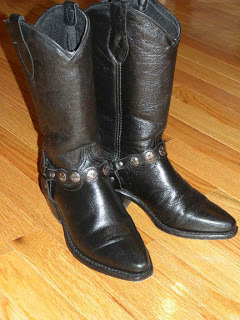 I stopped yesterday before I mentioned the Western dinner. To be perfectly honest, my budget doesn't usually allow the "high-priced" hotel events. Having been on the conference planning side for years in my previous life, I know there aren't many economical options when dealing with hotels and their food and beverage services. But, since the theme was Western, and I'm now an official 'Westerner', it wasn't like I had to deal with buying anything new. I did buy them recently, but not exclusively for the conference.
I stopped yesterday before I mentioned the Western dinner. To be perfectly honest, my budget doesn't usually allow the "high-priced" hotel events. Having been on the conference planning side for years in my previous life, I know there aren't many economical options when dealing with hotels and their food and beverage services. But, since the theme was Western, and I'm now an official 'Westerner', it wasn't like I had to deal with buying anything new. I did buy them recently, but not exclusively for the conference.
 I hooked up with Nancy and Donna, two of my buddies, and we worked our way through the chow line. Now, unlike most writing conferences, where the icebreaking question is, "What do you write," here it's "What do you read?" Everyone was friendly, and it really doesn't matter if you know a lot of people when you mingle at these events.
I hooked up with Nancy and Donna, two of my buddies, and we worked our way through the chow line. Now, unlike most writing conferences, where the icebreaking question is, "What do you write," here it's "What do you read?" Everyone was friendly, and it really doesn't matter if you know a lot of people when you mingle at these events.
After eating, I let Nancy be the brave soul who tried the mechanical bull. Too risky for my back. But I did let one of the cowhands try to teach me how to rope a calf. Let's just say the cattle population of Colorado (and the entire US, for that matter) has nothing to worry about. I got the theory down, but execution left a lot to be desired. (Unless you were the calf). And no, they weren't live, just metal mockups.
I fared a little better learning some line dances. My background was a couple years of ballet as a kid, and some ethnic folk dancing, primarily Greek and Israeli in college, so I didn't feel TOO out of place.
Not being much of a night person, I skipped the late-night "Mangasm" party and headed up to my bunk.
Day 2:
My first activity was the Mad Libs hour with readers. Our organizer gave us some commercially prepared Mad Libs sheets as well as a version created from Pride and Prejudice, and some works of the participating authors. In case there's anyone out there who doesn't remember or never played the game, you're given a short piece of writing. There are blanks where words have been removed. Only the group leader knows the story, and merely calls out for the correct part of speech. Since (if you play fair) the words are more or less random, some of them are better fits than others. Then, when you're done, you read it out loud, with all the blanks filled in, and the results can be hilarious—especially when the group decides it's fun to go a bit raunchy. Our table's favorite was an ad for an internet dating service. Let's just say we had a few cool lines in that one.
And now … the saga of Annuit Ollalong. I costumed up, including working my hair into braids as might befit a Native American and went down early to see if there was anything I could do to help, or (what I hoped for) some actual instructions! To my surprise, due to unforeseeable circumstances, we could no longer use the original story and we were thrust into uncharted waters. The new story was "A Chocolate Covered Killing, or Who Butchered the Baker?" I became Sugar Ann Spyce. I was a traveling saleswoman for Sugar Shack Confections, the wholesale distributors of GoDieVa Chocolates. One of my customers was brutally murdered on the night of her grand opening celebration for her new candy shop. At least the story was set in Texas, so most of my clothing was appropriate. I modified some jewelry, ditched the braids and hat, and was good to go.
**Note: It just so happens my current WIP also involves a woman who's opening a chocolate shop and there's a dead body, although it's not hers. I'm on Chapter 12 in the writing, so it's just a matter of another writing coincidence.
At least I showed up early enough to review the back story and my lines, including what I wasn't supposed to reveal. The attendees were divided into 8 groups, and each group visited one of the 8 suspects in turn, and we had 3 minutes to read our speeches and answer questions. We had three sets of clues to reveal, so the group made 3 circuits of the room. The thing was—they learned a LOT more than we knew, so they'd ask us questions we really didn't know how to answer, since we each had only a small piece of the picture. The only 'rules' were we couldn't lie about the facts we were given, but we also couldn't reveal the parts we were told had to be secret.
At the end, everyone turned in who they thought the killer was, and of course, prizes were aplenty. I wasn't the murderer, although I did have a few people tell me later that they thought I'd done it, so I guess I did all right in the deception department.
Out of time/space for today – come back tomorrow for more!
Back to RomCon.
 I stopped yesterday before I mentioned the Western dinner. To be perfectly honest, my budget doesn't usually allow the "high-priced" hotel events. Having been on the conference planning side for years in my previous life, I know there aren't many economical options when dealing with hotels and their food and beverage services. But, since the theme was Western, and I'm now an official 'Westerner', it wasn't like I had to deal with buying anything new. I did buy them recently, but not exclusively for the conference.
I stopped yesterday before I mentioned the Western dinner. To be perfectly honest, my budget doesn't usually allow the "high-priced" hotel events. Having been on the conference planning side for years in my previous life, I know there aren't many economical options when dealing with hotels and their food and beverage services. But, since the theme was Western, and I'm now an official 'Westerner', it wasn't like I had to deal with buying anything new. I did buy them recently, but not exclusively for the conference.  I hooked up with Nancy and Donna, two of my buddies, and we worked our way through the chow line. Now, unlike most writing conferences, where the icebreaking question is, "What do you write," here it's "What do you read?" Everyone was friendly, and it really doesn't matter if you know a lot of people when you mingle at these events.
I hooked up with Nancy and Donna, two of my buddies, and we worked our way through the chow line. Now, unlike most writing conferences, where the icebreaking question is, "What do you write," here it's "What do you read?" Everyone was friendly, and it really doesn't matter if you know a lot of people when you mingle at these events.After eating, I let Nancy be the brave soul who tried the mechanical bull. Too risky for my back. But I did let one of the cowhands try to teach me how to rope a calf. Let's just say the cattle population of Colorado (and the entire US, for that matter) has nothing to worry about. I got the theory down, but execution left a lot to be desired. (Unless you were the calf). And no, they weren't live, just metal mockups.
I fared a little better learning some line dances. My background was a couple years of ballet as a kid, and some ethnic folk dancing, primarily Greek and Israeli in college, so I didn't feel TOO out of place.
Not being much of a night person, I skipped the late-night "Mangasm" party and headed up to my bunk.
Day 2:
My first activity was the Mad Libs hour with readers. Our organizer gave us some commercially prepared Mad Libs sheets as well as a version created from Pride and Prejudice, and some works of the participating authors. In case there's anyone out there who doesn't remember or never played the game, you're given a short piece of writing. There are blanks where words have been removed. Only the group leader knows the story, and merely calls out for the correct part of speech. Since (if you play fair) the words are more or less random, some of them are better fits than others. Then, when you're done, you read it out loud, with all the blanks filled in, and the results can be hilarious—especially when the group decides it's fun to go a bit raunchy. Our table's favorite was an ad for an internet dating service. Let's just say we had a few cool lines in that one.
And now … the saga of Annuit Ollalong. I costumed up, including working my hair into braids as might befit a Native American and went down early to see if there was anything I could do to help, or (what I hoped for) some actual instructions! To my surprise, due to unforeseeable circumstances, we could no longer use the original story and we were thrust into uncharted waters. The new story was "A Chocolate Covered Killing, or Who Butchered the Baker?" I became Sugar Ann Spyce. I was a traveling saleswoman for Sugar Shack Confections, the wholesale distributors of GoDieVa Chocolates. One of my customers was brutally murdered on the night of her grand opening celebration for her new candy shop. At least the story was set in Texas, so most of my clothing was appropriate. I modified some jewelry, ditched the braids and hat, and was good to go.
**Note: It just so happens my current WIP also involves a woman who's opening a chocolate shop and there's a dead body, although it's not hers. I'm on Chapter 12 in the writing, so it's just a matter of another writing coincidence.
At least I showed up early enough to review the back story and my lines, including what I wasn't supposed to reveal. The attendees were divided into 8 groups, and each group visited one of the 8 suspects in turn, and we had 3 minutes to read our speeches and answer questions. We had three sets of clues to reveal, so the group made 3 circuits of the room. The thing was—they learned a LOT more than we knew, so they'd ask us questions we really didn't know how to answer, since we each had only a small piece of the picture. The only 'rules' were we couldn't lie about the facts we were given, but we also couldn't reveal the parts we were told had to be secret.
At the end, everyone turned in who they thought the killer was, and of course, prizes were aplenty. I wasn't the murderer, although I did have a few people tell me later that they thought I'd done it, so I guess I did all right in the deception department.
Out of time/space for today – come back tomorrow for more!
Published on August 10, 2011 04:00
August 9, 2011
Letting Go
My guest today is author Sharon Hamilton, who writes paranormal romance and contemporary SEAL romance in Northern California.
Is this Indie craze for you? Are you too late?
There are so many wonderful opportunities today for authors, especially with the rise of the Indie publishing wave. At the recent RWA Convention in NYC, I heard it said that this phenomenon is broadening the window a bit, giving readers more variety, and therefore expanding the numbers of authors who can participate. Indie has not only changed the lives of authors, but it has changed strategy for literary agents, and for publishers as well. The reader is now getting a plethora of new authors to explore, getting these books faster and cheaper. Will more books be sold? Are readers reading more than before? I don't know the answer to those questions.
As with any changing market trend, there are pros and cons. Just when we think we've learned how it all works, everything changes again. Authors who never made much money on their books that languished out of print can resurrect them, dust them off, edit and re-launched in eBook format, where they can keep the lion's share of the profits. This new life has brought instant riches for not only NYC best-selling authors, but mid-list authors as well. Author's backlists are paying some serious bills, and allowing some to look forward to an actual retirement. Every week we are flooded with names of people making mega six figure incomes. It all looks so easy.
But this is only happening to some authors. In fact, most authors are not having this kind of success. And that's what I want to talk about today.
I've already heard the grumbling about what way is the right way: traditional publishing vs. Indie publishing, and whether or not you can or can't do both. It is an individual decision, and a hot ongoing debate. Not everyone likes to do self-promotion, multiple blog hopping. Not everyone wants to hire an editor or design their own covers. Some people lack confidence and others are fearless. Both of these groups will have failures, and successes.
With all the blogs and loop news, it's pretty hard not to feel, if you haven't tried Indie publishing, that perhaps you have missed the boat already. Or, if you have, and your sales are not phenomenal, like other author's sales, that perhaps you aren't a good writer.
I'm happy for the successes I read about. But some days I have to work to remind myself, "Don't compare your insides with someone else's outsides." Now that sales and rankings are so public, it's harder to ignore the boisterous whoo hoo's on our loops. For some writers, all this good news can be debilitating. We question ourselves, when we should be doing the opposite. And who said a top-ranked book on Amazon is any better than a non-top-ranked? Haven't we all read some real NYT- Best-Selling stinkers?
What I say is just let go of all that chatter going on inside your head. Just focus on telling the story you were born to tell (thank you, Brenda Novak for that jewel). Be the best writer you can be. Expand and try something new, but do it your way. Your way may not be the way everyone else does it. AND THAT'S JUST FINE.
If you are new to this, try putting something up Indie and dip your toe in the water. It's like eating the elephant one bit at a time. You can't do it all at once, or you'll spread yourself too thin. But if you jump in, just a little, you'll find it not as scary as it seems at first. If you've been a successful traditionally published author and don't want to try the Indie craze, don't. Stick with what works.
Be realistic about your craft level and your ability and desire to promote yourself and your books.
Remember, most Indie published authors don't get the home run the first time they hit the market. It often takes 3-5 books before sales start increasing. And I've talked to authors that had to get 8 up before they saw their sales figures start to spike. We all know the authors who wrote a dozen or more books before they sold their first one. Guess what? Some things never change!
It can be discouraging if you haven't sold lots of books, either traditionally published or Indie. No one knows the answer, or has the monopoly on all the good ideas. Most of it is trial and error.
I say don't let the success or failure of those around you, or even your own ego get in the way. Tackle a few new things and incorporate what you comfortably can into your writing lifestyle, and run with it. Don't try to do it all. Ask for help, but don't expect you'll be able to duplicate what they do.
We always overestimate what we can do in a day, but underestimate what we can achieve in a year. Give yourself the time to grow into the writer you want to be.
Mark Twain said the difference between a published author and a non-published author is that a published author kept writing until he got published.
Becoming a great writer takes focus and the desire to be great. It doesn't happen by accident. And it has little to do with natural talent, and everything to do with stamina. Other authors might make it look easy. But the reality is, becoming a successful author is still a lot of work.
I leave you with one of my favorite quotes, from G. Eliot: It's never too late to be what you could have been.
For more about Sharon, you can find her at her blog and at her website. Her debut novel, ANGEL, is available in eformat.
Is this Indie craze for you? Are you too late?
There are so many wonderful opportunities today for authors, especially with the rise of the Indie publishing wave. At the recent RWA Convention in NYC, I heard it said that this phenomenon is broadening the window a bit, giving readers more variety, and therefore expanding the numbers of authors who can participate. Indie has not only changed the lives of authors, but it has changed strategy for literary agents, and for publishers as well. The reader is now getting a plethora of new authors to explore, getting these books faster and cheaper. Will more books be sold? Are readers reading more than before? I don't know the answer to those questions.
As with any changing market trend, there are pros and cons. Just when we think we've learned how it all works, everything changes again. Authors who never made much money on their books that languished out of print can resurrect them, dust them off, edit and re-launched in eBook format, where they can keep the lion's share of the profits. This new life has brought instant riches for not only NYC best-selling authors, but mid-list authors as well. Author's backlists are paying some serious bills, and allowing some to look forward to an actual retirement. Every week we are flooded with names of people making mega six figure incomes. It all looks so easy.
But this is only happening to some authors. In fact, most authors are not having this kind of success. And that's what I want to talk about today.
I've already heard the grumbling about what way is the right way: traditional publishing vs. Indie publishing, and whether or not you can or can't do both. It is an individual decision, and a hot ongoing debate. Not everyone likes to do self-promotion, multiple blog hopping. Not everyone wants to hire an editor or design their own covers. Some people lack confidence and others are fearless. Both of these groups will have failures, and successes.
With all the blogs and loop news, it's pretty hard not to feel, if you haven't tried Indie publishing, that perhaps you have missed the boat already. Or, if you have, and your sales are not phenomenal, like other author's sales, that perhaps you aren't a good writer.
I'm happy for the successes I read about. But some days I have to work to remind myself, "Don't compare your insides with someone else's outsides." Now that sales and rankings are so public, it's harder to ignore the boisterous whoo hoo's on our loops. For some writers, all this good news can be debilitating. We question ourselves, when we should be doing the opposite. And who said a top-ranked book on Amazon is any better than a non-top-ranked? Haven't we all read some real NYT- Best-Selling stinkers?
What I say is just let go of all that chatter going on inside your head. Just focus on telling the story you were born to tell (thank you, Brenda Novak for that jewel). Be the best writer you can be. Expand and try something new, but do it your way. Your way may not be the way everyone else does it. AND THAT'S JUST FINE.
If you are new to this, try putting something up Indie and dip your toe in the water. It's like eating the elephant one bit at a time. You can't do it all at once, or you'll spread yourself too thin. But if you jump in, just a little, you'll find it not as scary as it seems at first. If you've been a successful traditionally published author and don't want to try the Indie craze, don't. Stick with what works.
Be realistic about your craft level and your ability and desire to promote yourself and your books.
Remember, most Indie published authors don't get the home run the first time they hit the market. It often takes 3-5 books before sales start increasing. And I've talked to authors that had to get 8 up before they saw their sales figures start to spike. We all know the authors who wrote a dozen or more books before they sold their first one. Guess what? Some things never change!
It can be discouraging if you haven't sold lots of books, either traditionally published or Indie. No one knows the answer, or has the monopoly on all the good ideas. Most of it is trial and error.
I say don't let the success or failure of those around you, or even your own ego get in the way. Tackle a few new things and incorporate what you comfortably can into your writing lifestyle, and run with it. Don't try to do it all. Ask for help, but don't expect you'll be able to duplicate what they do.
We always overestimate what we can do in a day, but underestimate what we can achieve in a year. Give yourself the time to grow into the writer you want to be.
Mark Twain said the difference between a published author and a non-published author is that a published author kept writing until he got published.
Becoming a great writer takes focus and the desire to be great. It doesn't happen by accident. And it has little to do with natural talent, and everything to do with stamina. Other authors might make it look easy. But the reality is, becoming a successful author is still a lot of work.
I leave you with one of my favorite quotes, from G. Eliot: It's never too late to be what you could have been.
For more about Sharon, you can find her at her blog and at her website. Her debut novel, ANGEL, is available in eformat.
Published on August 09, 2011 05:00
August 8, 2011
RomCon Report 1
From last week's guest post. Colleen & Shaun have announced Cindy as the winner of How to Write a Dick: A Guide for Writing Fictional Sleuths from a Couple of Real-Life Sleuths
What I'm reading: Silver Lies, by Anne Parker (book club); First Thrills (anthology), Lee Child (editor)
I'm writing this after nearly three full days of conference activities (especially if you count drive time in your day), so forgive any incoherence.
RomCon is a reader-focused conference, so very little in the way of craft type workshops, but a lot of information nevertheless.
First off, the conference has a 'buddy' program, where attendees are matched and an author is part of each group. I want to say how thrilled I was to meet and spend time with Heather, Donna, and Nancy, and I hope they weren't disappointed that they didn't get a more famous author assigned to them.
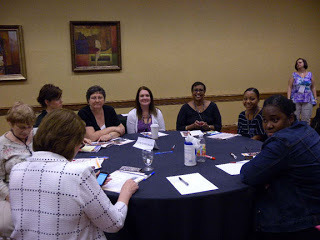
First event was a welcome, where Sue Grimshaw, who's always keeping her finger on the pulse of the marketplace took a brief survey of the group. Bottom line: almost every person at the conference reads both print and e-books, and shops in brick and mortar stores as well as on line.
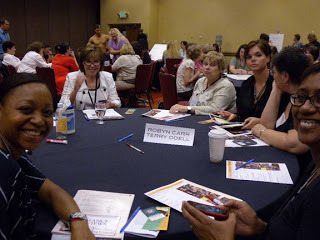
After that, I was one of the authors participating in a Build a Hero game. Two authors (I was fortunate to be paired with the wonderful Robyn Carr) sat at a table with a group of readers, and we were given worksheets to determine what a "perfect" hero would be. We discussed his appearance, background, fears, goals, desires, what he would never do, and any other characteristics we felt were important.
It was fun and interesting, as we were required to come to a consensus, and with ten individuals with ten different ideas of what makes a perfect hero, the discussions were both heated and funny. One thing we discussed was the fact that the worksheet didn't really have any place to consider the plot (although we kept getting sidetracked with plot ideas. It also didn't allow for the difference in the character at the beginning of the book compared with the ending.
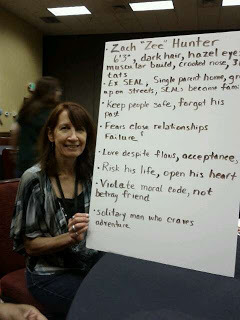 Our hero ended up being Zach "Zee" Hunter, a former Navy SEAL. He's got dark hair, green eyes, and a crooked nose, and is six-three. He grew up in a single-parent household and was a street kid. He joined the Navy to find the family he never had. He left the SEALs after he lost some of his men and is now driven to keep everyone safe. He's a loner, but doesn't realize that he really wants to be accepted, flaws and all. He'd do whatever it takes to keep people safe, and would never betray a trust.
Our hero ended up being Zach "Zee" Hunter, a former Navy SEAL. He's got dark hair, green eyes, and a crooked nose, and is six-three. He grew up in a single-parent household and was a street kid. He joined the Navy to find the family he never had. He left the SEALs after he lost some of his men and is now driven to keep everyone safe. He's a loner, but doesn't realize that he really wants to be accepted, flaws and all. He'd do whatever it takes to keep people safe, and would never betray a trust.
Each table (we were divided up by sub-genres) had to write all our points on a large white board, and then present our hero to the entire room. I volunteered to do the writing, and Robyn did our presentation. Of course, she managed to sneak in one of the points we were merely joking about – that our hero was impotent and he'd need the love of a very special woman to be whole again.
The organizer used the applause system to determine the winner. Of course each table cheered for its own creation, so the final decision was done by lottery. It was a great time!
The other activity of the day was a 3 track session hosted by Cindy Gerard and Tara Janzen on aspects of black ops in writing. They had a few guest speakers who are experts in weaponry, and they shared information (and lots of their toys) with the group.
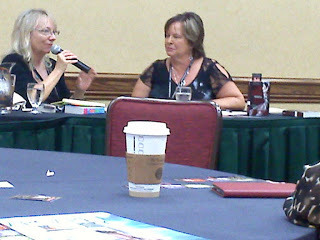
They also discussed some of the crafting issues in writing, and most carry over into any genre. Some takeaways:
Trust is always an issue.
Larger than Life heroes need Larger than Life Feelings.
Pet peeves in books: Using the Stupid Woman Plot Motivator. If your character is doing something stupid simply because you need it to make a plot point, nobody is going to believe or like the character. Not to say people don't do stupid things and make poor choices, but you can't create the foundation of a plot or scene based on stupidity.
Creating depth of character means showing honest emotions.
Another excellent point Tara made was that it's not simply action-reaction. In reality, it's action, emotion, thought, reaction. To make your characters realistic, if there's some kind of action, their immediate response is an emotional one. Then, they'll think, and then they'll act. If you show the emotions, and how they respond, then their reactions will be believable, and readers will care about the characters.
They also had lots of 'toys' for us to look at!

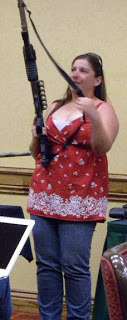 One very thought-provoking point was made by the guest speaker, who is an expert in just about anything weapon-related, and who has an extensive background in military and beyond. He stood before us in slacks, a jacket and tie, and asked how many weapons we thought he had on his person. Guesses ranged from three to about fifteen. After he removed several guns, knives, and the like, he said the correct answer was "one." His point was that a person's brain is his weapon, and all the other things he had were merely tools.
One very thought-provoking point was made by the guest speaker, who is an expert in just about anything weapon-related, and who has an extensive background in military and beyond. He stood before us in slacks, a jacket and tie, and asked how many weapons we thought he had on his person. Guesses ranged from three to about fifteen. After he removed several guns, knives, and the like, he said the correct answer was "one." His point was that a person's brain is his weapon, and all the other things he had were merely tools.
And, I was please that one of my blog 'regulars', Gun Diva, was also part of the program.
Like this post? Click the +1 button below and spread the word.
That's all for today – tomorrow, my guest is Sharon Hamilton, whose topic is Letting Go. I'll be back Wednesday with more – including what happened to Annuit Ollalong.
What I'm reading: Silver Lies, by Anne Parker (book club); First Thrills (anthology), Lee Child (editor)
I'm writing this after nearly three full days of conference activities (especially if you count drive time in your day), so forgive any incoherence.
RomCon is a reader-focused conference, so very little in the way of craft type workshops, but a lot of information nevertheless.
First off, the conference has a 'buddy' program, where attendees are matched and an author is part of each group. I want to say how thrilled I was to meet and spend time with Heather, Donna, and Nancy, and I hope they weren't disappointed that they didn't get a more famous author assigned to them.

First event was a welcome, where Sue Grimshaw, who's always keeping her finger on the pulse of the marketplace took a brief survey of the group. Bottom line: almost every person at the conference reads both print and e-books, and shops in brick and mortar stores as well as on line.

After that, I was one of the authors participating in a Build a Hero game. Two authors (I was fortunate to be paired with the wonderful Robyn Carr) sat at a table with a group of readers, and we were given worksheets to determine what a "perfect" hero would be. We discussed his appearance, background, fears, goals, desires, what he would never do, and any other characteristics we felt were important.
It was fun and interesting, as we were required to come to a consensus, and with ten individuals with ten different ideas of what makes a perfect hero, the discussions were both heated and funny. One thing we discussed was the fact that the worksheet didn't really have any place to consider the plot (although we kept getting sidetracked with plot ideas. It also didn't allow for the difference in the character at the beginning of the book compared with the ending.
 Our hero ended up being Zach "Zee" Hunter, a former Navy SEAL. He's got dark hair, green eyes, and a crooked nose, and is six-three. He grew up in a single-parent household and was a street kid. He joined the Navy to find the family he never had. He left the SEALs after he lost some of his men and is now driven to keep everyone safe. He's a loner, but doesn't realize that he really wants to be accepted, flaws and all. He'd do whatever it takes to keep people safe, and would never betray a trust.
Our hero ended up being Zach "Zee" Hunter, a former Navy SEAL. He's got dark hair, green eyes, and a crooked nose, and is six-three. He grew up in a single-parent household and was a street kid. He joined the Navy to find the family he never had. He left the SEALs after he lost some of his men and is now driven to keep everyone safe. He's a loner, but doesn't realize that he really wants to be accepted, flaws and all. He'd do whatever it takes to keep people safe, and would never betray a trust.Each table (we were divided up by sub-genres) had to write all our points on a large white board, and then present our hero to the entire room. I volunteered to do the writing, and Robyn did our presentation. Of course, she managed to sneak in one of the points we were merely joking about – that our hero was impotent and he'd need the love of a very special woman to be whole again.
The organizer used the applause system to determine the winner. Of course each table cheered for its own creation, so the final decision was done by lottery. It was a great time!
The other activity of the day was a 3 track session hosted by Cindy Gerard and Tara Janzen on aspects of black ops in writing. They had a few guest speakers who are experts in weaponry, and they shared information (and lots of their toys) with the group.

They also discussed some of the crafting issues in writing, and most carry over into any genre. Some takeaways:
Trust is always an issue.
Larger than Life heroes need Larger than Life Feelings.
Pet peeves in books: Using the Stupid Woman Plot Motivator. If your character is doing something stupid simply because you need it to make a plot point, nobody is going to believe or like the character. Not to say people don't do stupid things and make poor choices, but you can't create the foundation of a plot or scene based on stupidity.
Creating depth of character means showing honest emotions.
Another excellent point Tara made was that it's not simply action-reaction. In reality, it's action, emotion, thought, reaction. To make your characters realistic, if there's some kind of action, their immediate response is an emotional one. Then, they'll think, and then they'll act. If you show the emotions, and how they respond, then their reactions will be believable, and readers will care about the characters.
They also had lots of 'toys' for us to look at!

 One very thought-provoking point was made by the guest speaker, who is an expert in just about anything weapon-related, and who has an extensive background in military and beyond. He stood before us in slacks, a jacket and tie, and asked how many weapons we thought he had on his person. Guesses ranged from three to about fifteen. After he removed several guns, knives, and the like, he said the correct answer was "one." His point was that a person's brain is his weapon, and all the other things he had were merely tools.
One very thought-provoking point was made by the guest speaker, who is an expert in just about anything weapon-related, and who has an extensive background in military and beyond. He stood before us in slacks, a jacket and tie, and asked how many weapons we thought he had on his person. Guesses ranged from three to about fifteen. After he removed several guns, knives, and the like, he said the correct answer was "one." His point was that a person's brain is his weapon, and all the other things he had were merely tools.And, I was please that one of my blog 'regulars', Gun Diva, was also part of the program.
Like this post? Click the +1 button below and spread the word.
That's all for today – tomorrow, my guest is Sharon Hamilton, whose topic is Letting Go. I'll be back Wednesday with more – including what happened to Annuit Ollalong.
Published on August 08, 2011 04:00
August 5, 2011
Friday Field Trip - WODOC
I'm in Denver at RomCon, but while I'm gone, here are some more pictures I took on my recent trip to Los Angeles.
Not far up the street from my parents' house is a place that might look familiar to anyone who watches television or goes to the movies. Franklin Canyon Park, which is frequently invaded by Hollywood film crews is part of the National Park system. WODOC, which is the William O. Douglas Outdoor Classroom is part of the area. We went up and walked around a bit while I was in LA. Here are some pictures.



I don't have any fancy equipment like Jason, so my bird shots don't come close to what he does, but here's a coot and one of her chicks.
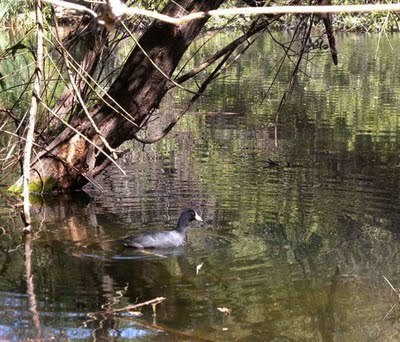

And some more of the scenery.



Not far up the street from my parents' house is a place that might look familiar to anyone who watches television or goes to the movies. Franklin Canyon Park, which is frequently invaded by Hollywood film crews is part of the National Park system. WODOC, which is the William O. Douglas Outdoor Classroom is part of the area. We went up and walked around a bit while I was in LA. Here are some pictures.



I don't have any fancy equipment like Jason, so my bird shots don't come close to what he does, but here's a coot and one of her chicks.


And some more of the scenery.


Published on August 05, 2011 04:00
August 4, 2011
RomCon - A Reader-focused Conference
What I'm reading: A Moment in Time, by Deb Stover
Don't forget to leave a comment on Tuesday's post for a chance to win Colleen & Shaun's book. (And even if you don't want the book, it's a great post.)
 This afternoon, I'm heading down the mountain to visit with family, spend the night, and save about an hour of early-morning mountain drive time on my way to RomCon first thing tomorrow morning.
This afternoon, I'm heading down the mountain to visit with family, spend the night, and save about an hour of early-morning mountain drive time on my way to RomCon first thing tomorrow morning.
RomCon is a readers' conference. Instead of the things I'm used to a writing conferences, like craft-focused workshops and speakers, this one is all about readers getting to meet and mingle with authors. Last year I was on the 'reader' side of the conference, but this time, I'm an official author attendee.
I don't pretend that there will be people dying to meet me—or even recognize my name. But from a professional standpoint, one hopes that by the end of the conference there will be a few people who do know who I am and what I write.
I'm participating in three of the events. First is a session on building a hero. Authors from various sub-genres of romance will be at tables, joined by attendees. We'll have a worksheet and attempt to narrow down the qualities of a good hero.
Then, there's a contemporary mixer. Here, the setup again is to have authors at tables, and we'll play some rounds of Mad Libs. The organizer has a variety of playing sheets, from classic movies to familiar books (okay, familiar to most. I STILL haven't read Pride and Prejudice), to excerpts from our own books.
And last, I'm taking part in a murder mystery. Here, authors are playing roles and the attendees have to go to each author in turn, listen to their prepared speech, and figure out who the killer is. The story is set in the small fictitious town of Deadhead, Colorado.
For this one, I got the information about the crime, the suspects, and the role I was assigned to play. I'm going to be Annuit Ollalong, a Native American who is also the town's resident psychic/gypsy fortuneteller/coffee grounds reader.
Although they provide my script and props, I'm responsible for my own costume.
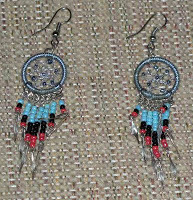 So, what does a current day, Native American psychic/gypsy fortuneteller coffee grounds reader wear? Given that one of my "rules" is that I don't spend money on conference things I'll never wear/use again, I searched my closet.
So, what does a current day, Native American psychic/gypsy fortuneteller coffee grounds reader wear? Given that one of my "rules" is that I don't spend money on conference things I'll never wear/use again, I searched my closet.
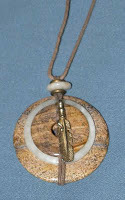 Long, grown broomstick skirt. Denim jacket. I did bend my rule when we were at the local farmer's market/craft fair last week and bought an inexpensive pair of dreamcatcher earrings that I figure I can wear again.
Long, grown broomstick skirt. Denim jacket. I did bend my rule when we were at the local farmer's market/craft fair last week and bought an inexpensive pair of dreamcatcher earrings that I figure I can wear again.
Either my new cowboy boots (assuming the store gets them in as promised--I don't consider them a "special" purchase, as I'd ordered them before I got my assigned part, and after all, I do live in Colorado now!) or bedroom slippers that look enough like moccasins to pass. Hair in pigtails under my cowboy hat. I have a necklace my daughter made that definitely has a Native American thing going.
Should be fun. I'll report back next week.
And please come back. Even though I'm in Denver, you can enjoy the second part of my Friday Field Trip to Los Angeles. We're going to WODOC. Don't know what/where that is? Then be sure to come back and see.
Don't forget to leave a comment on Tuesday's post for a chance to win Colleen & Shaun's book. (And even if you don't want the book, it's a great post.)
 This afternoon, I'm heading down the mountain to visit with family, spend the night, and save about an hour of early-morning mountain drive time on my way to RomCon first thing tomorrow morning.
This afternoon, I'm heading down the mountain to visit with family, spend the night, and save about an hour of early-morning mountain drive time on my way to RomCon first thing tomorrow morning.RomCon is a readers' conference. Instead of the things I'm used to a writing conferences, like craft-focused workshops and speakers, this one is all about readers getting to meet and mingle with authors. Last year I was on the 'reader' side of the conference, but this time, I'm an official author attendee.
I don't pretend that there will be people dying to meet me—or even recognize my name. But from a professional standpoint, one hopes that by the end of the conference there will be a few people who do know who I am and what I write.
I'm participating in three of the events. First is a session on building a hero. Authors from various sub-genres of romance will be at tables, joined by attendees. We'll have a worksheet and attempt to narrow down the qualities of a good hero.
Then, there's a contemporary mixer. Here, the setup again is to have authors at tables, and we'll play some rounds of Mad Libs. The organizer has a variety of playing sheets, from classic movies to familiar books (okay, familiar to most. I STILL haven't read Pride and Prejudice), to excerpts from our own books.
And last, I'm taking part in a murder mystery. Here, authors are playing roles and the attendees have to go to each author in turn, listen to their prepared speech, and figure out who the killer is. The story is set in the small fictitious town of Deadhead, Colorado.
For this one, I got the information about the crime, the suspects, and the role I was assigned to play. I'm going to be Annuit Ollalong, a Native American who is also the town's resident psychic/gypsy fortuneteller/coffee grounds reader.
Although they provide my script and props, I'm responsible for my own costume.
 So, what does a current day, Native American psychic/gypsy fortuneteller coffee grounds reader wear? Given that one of my "rules" is that I don't spend money on conference things I'll never wear/use again, I searched my closet.
So, what does a current day, Native American psychic/gypsy fortuneteller coffee grounds reader wear? Given that one of my "rules" is that I don't spend money on conference things I'll never wear/use again, I searched my closet. Long, grown broomstick skirt. Denim jacket. I did bend my rule when we were at the local farmer's market/craft fair last week and bought an inexpensive pair of dreamcatcher earrings that I figure I can wear again.
Long, grown broomstick skirt. Denim jacket. I did bend my rule when we were at the local farmer's market/craft fair last week and bought an inexpensive pair of dreamcatcher earrings that I figure I can wear again.Either my new cowboy boots (assuming the store gets them in as promised--I don't consider them a "special" purchase, as I'd ordered them before I got my assigned part, and after all, I do live in Colorado now!) or bedroom slippers that look enough like moccasins to pass. Hair in pigtails under my cowboy hat. I have a necklace my daughter made that definitely has a Native American thing going.
Should be fun. I'll report back next week.
And please come back. Even though I'm in Denver, you can enjoy the second part of my Friday Field Trip to Los Angeles. We're going to WODOC. Don't know what/where that is? Then be sure to come back and see.
Published on August 04, 2011 04:00
August 3, 2011
Non-Writing Aspects of Writing
Today, I'm over at author Kelly McClymer's blog, where I'm talking about some of the "non-writing" parts of being a writer, including the dreaded cover blurbs. I've got an offer for a free copy of one of my books, so please drop by to see how to get one. It's not a contest, just an offer.
And, in other news:
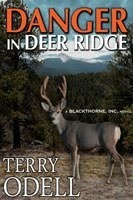 I just found out last night that
The Red Room
has chosen DANGER IN DEER RIDGE as their book of the day today.
I just found out last night that
The Red Room
has chosen DANGER IN DEER RIDGE as their book of the day today.
Have you checked the Deals & Steals tab this month? There's a limited time (2 weeks) offer on discounted books at All Romance eBooks.
And don't forget to leave a comment on yesterday's post for a chance to win a free book.
And, in other news:
 I just found out last night that
The Red Room
has chosen DANGER IN DEER RIDGE as their book of the day today.
I just found out last night that
The Red Room
has chosen DANGER IN DEER RIDGE as their book of the day today.Have you checked the Deals & Steals tab this month? There's a limited time (2 weeks) offer on discounted books at All Romance eBooks.
And don't forget to leave a comment on yesterday's post for a chance to win a free book.
Published on August 03, 2011 05:02
August 2, 2011
Writing a Rural Surveillance
Today I'm welcoming a writing/private investigating duo, Colleen Collins & Shaun Kaufman, who are going to give us some handy hints about private investigators and surveillance. They're giving away a copy of their book, so be sure to read through and leave a comment. You have until Friday to leave a comment, but I won't get the winner posted until Monday because I'll be off the grid at RomCon.

When many people think of a private investigator, they think "surveillance." Typical images that come to mind are the PI in his vehicle following a subject's car through traffic or a PI parked somewhere, watching the subject's residence or work. If a writer is crafting a city surveillance, she'll take into consideration such things as the flow of traffic, how closely the PI follows the subject's vehicle, and possible side streets the PI might take.
But what if your story is set in the country? Or your big-city investigator must travel to a rural area to conduct a surveillance? Here's some tips from a couple of real-life PIs for writing a rural surveillance starring your fictional PI.
Know the area: In our part of the country, we have some impressive, wide-open stretches of country outside of "the big cities." When we're going into a rural area, we'll first check online maps (for example, MapQuest and Google Earth). Have your fictional PI do the same. We've scheduled rural surveillances in areas that are so remote, they don't even show up in online maps! In such cases, we contact the sheriff's office for that region and request help with directions and maps.
On the other hand, if you're looking for more conflict in your story, have your sleuth circling around and attracting unwanted attention in that small town!Use an appropriate vehicle. Maybe your fictional PI scoots around town in a lime-green VW, but that dog won't hunt in the country. In a small town, everybody knows everybody else, including what car they drive. A PI will drive a vehicle that blends in, is nondescript and can handle the terrain. Also, avoid using vehicles with identifiers such as decals, vanity plates and bumper stickers. Or maybe you want to write a humorous scene where the town folk all know the pick-up with the "Don't make me go medieval on you" bumper sticker is that city-slicker PI who's playing undercover.
Why is the PI parked there? A PI can be parked on a country public road and document whatever he sees "in plain view" -- but he'd better have a good reason for being there if someone asks. Most PIs keeps props ready, such as binoculars and a bird guide (pretending she's a bird watcher), car-repair tools (pretending he's fixing his car) and so on.
Look the part: Just as a PI wears clothes appropriate to a city location, he'll wear clothes that blend in to that part of the country/season. When we did a winter rural surveillance in Colorado, we wore jeans, t-shirts, boots and jackets.
Choose useful equipment: It's always iffy if a cell phone will have adequate transmission in remote areas (which can add a twist to your story), but other equipment can be selected for rural surveillance (cameras with increased optical zoom, video equipment that is functional, portable and low profile). And you never know -- maybe a laptop with wireless connectivity can connect to some farmhouse's wireless Internet service, which can give your fictional PI access to the Internet.
Thank you, Terry, for hosting us today at Terry's Place. We'll be checking in throughout the day, answering any questions readers might have about rural surveillances. On Friday, we'll randomly pick a name for the visitors to win a Kindle version of How to Write a Dick (owning a Kindle device isn't necessary because there are free, downloadable Kindle apps for PCs and Macs).
Colleen Collins and Shaun Kaufman are legal investigators who co-own Highlands Investigations & Legal Services, Inc. in Denver, Colorado. Their non-fiction ebook How to Write a Dick: a Guide for Writing Fictional Sleuths from a Couple of Real-Life Sleuths is available on Kindle: http://www.amazon.com/dp/B00595K1UK/

When many people think of a private investigator, they think "surveillance." Typical images that come to mind are the PI in his vehicle following a subject's car through traffic or a PI parked somewhere, watching the subject's residence or work. If a writer is crafting a city surveillance, she'll take into consideration such things as the flow of traffic, how closely the PI follows the subject's vehicle, and possible side streets the PI might take.
But what if your story is set in the country? Or your big-city investigator must travel to a rural area to conduct a surveillance? Here's some tips from a couple of real-life PIs for writing a rural surveillance starring your fictional PI.
Know the area: In our part of the country, we have some impressive, wide-open stretches of country outside of "the big cities." When we're going into a rural area, we'll first check online maps (for example, MapQuest and Google Earth). Have your fictional PI do the same. We've scheduled rural surveillances in areas that are so remote, they don't even show up in online maps! In such cases, we contact the sheriff's office for that region and request help with directions and maps.
On the other hand, if you're looking for more conflict in your story, have your sleuth circling around and attracting unwanted attention in that small town!Use an appropriate vehicle. Maybe your fictional PI scoots around town in a lime-green VW, but that dog won't hunt in the country. In a small town, everybody knows everybody else, including what car they drive. A PI will drive a vehicle that blends in, is nondescript and can handle the terrain. Also, avoid using vehicles with identifiers such as decals, vanity plates and bumper stickers. Or maybe you want to write a humorous scene where the town folk all know the pick-up with the "Don't make me go medieval on you" bumper sticker is that city-slicker PI who's playing undercover.
Why is the PI parked there? A PI can be parked on a country public road and document whatever he sees "in plain view" -- but he'd better have a good reason for being there if someone asks. Most PIs keeps props ready, such as binoculars and a bird guide (pretending she's a bird watcher), car-repair tools (pretending he's fixing his car) and so on.
Look the part: Just as a PI wears clothes appropriate to a city location, he'll wear clothes that blend in to that part of the country/season. When we did a winter rural surveillance in Colorado, we wore jeans, t-shirts, boots and jackets.
Choose useful equipment: It's always iffy if a cell phone will have adequate transmission in remote areas (which can add a twist to your story), but other equipment can be selected for rural surveillance (cameras with increased optical zoom, video equipment that is functional, portable and low profile). And you never know -- maybe a laptop with wireless connectivity can connect to some farmhouse's wireless Internet service, which can give your fictional PI access to the Internet.
Thank you, Terry, for hosting us today at Terry's Place. We'll be checking in throughout the day, answering any questions readers might have about rural surveillances. On Friday, we'll randomly pick a name for the visitors to win a Kindle version of How to Write a Dick (owning a Kindle device isn't necessary because there are free, downloadable Kindle apps for PCs and Macs).
Colleen Collins and Shaun Kaufman are legal investigators who co-own Highlands Investigations & Legal Services, Inc. in Denver, Colorado. Their non-fiction ebook How to Write a Dick: a Guide for Writing Fictional Sleuths from a Couple of Real-Life Sleuths is available on Kindle: http://www.amazon.com/dp/B00595K1UK/
Published on August 02, 2011 05:00
August 1, 2011
Research the Details—But…
What I'm reading: Rogue Warrior by Richard Marcinko; One True Love, by Barbara Freethy.
I recently read a book where a character was learning to fly a small jet. The character was already an experienced pilot, but hadn't been trained on this type of aircraft. The author is also a pilot, and as I read the scene—pages and pages of it—it was clear enough to me that the author was simply showing his readers how much he knew about the topic.

To me, it was a hair-pulling couple of chapters. Maybe pilots enjoy it, but to me, it would be like showing a person learning how to drive a car, and following the along as they learned where to put the key, how to turn it, where the brakes were, and then followed along every inch of driveway and road on their first excursion. Had absolutely nothing to do with the story other than getting the character qualified so he could drive the company plane.
The trick to showing details is not to show the reader how much research you've done, but to use only what the POV character needs to show in the scene. If it's a naïve character, then they're likely to be thinking more about the details, either a how-to, or a more detailed description as they absorb new surroundings. But if they're experienced, then they're probably barely going to think about things. How often do you walk into your bedroom and notice the color of paint on the wall, or the precise shade of blue of your bedspread?
Since I set the book in the area where I live, and I haven't lived here long, I didn't really know what kind of a plant my guy would be giving her. I know we can't do any serious landscaping where we live—between the deer and the watering restrictions, nothing would survive. When I was ready to replace the XXX research plants notation in my manuscript, I searched for information on xeriscaping in the Colorado mountains, and came up with some possible plants. I didn't need to know much more about them than what they looked like—did they have flowers, and if so, what color—and that they'd grow where my scene was set. As long as the scene wasn't about the heroine trying to landscape her yard, there was no reason to go into detail.
This is the final scene. In it I hope I've given the reader enough information without pontificating or slowing the story.
"Hi," he said. "I hope you don't mind me stopping by unannounced, but I wanted to give you this. Consider it a housewarming gift."
She fingered the oval green leaves and tiny yellow flowers. "What is it?"
"A Siberian peashrub. Caragana arborescen, if you want to get technical."
"It's lovely, but a gift isn't necessary."
"My pleasure, although I'll confess to an ulterior motive."
What motive? Her heart jumped. She shifted into what she considered her social mode. How many dreary events had she endured as the loving wife of Victor? She knew how to be polite, how to pretend to listen to boring conversation, and how to excuse herself when she couldn't tolerate any more. Not that there was anywhere to go with Mr. Logan on her porch. She gave him a polite smile. "What would that be?"
"If you'll let me plant it—and a few more—it'll be good advertising for my business."
"I'm not sure that's a smart idea. I'm not much of a gardener. I'm afraid dead plants won't have customers seeking your services."
He chuckled. "That's not a problem. I specialize in xeriscaping."
"What's xeriscaping? Sounds complicated."
"Not in the least. Means I use plants that grow in this climate, without you having to water them, or do much of anything."
In another scene, in my current WIP, I have two detectives trying to solve what is probably a homicide. As I mentioned in last week's post, I listen in as they discuss the case, and write what they're saying. But as I wrote, I realized I wasn't sure what the proper cop 'lingo' would be when they're talking about the deceased woman.
I emailed a cop contact (if you write any kind of crime fiction and haven't found Lee Lofland's blog, The Graveyard Shift, get over there!) and asked him whether they'd refer to her as 1) Felicity; 2) Felicity Markham; 3) Markham; or 4) Miss Markham. Then, on a whim, I stuck in a #5 – 'the victim'
He answered almost immediately: We never call them by name, We'd refer to her as the victim (note: not, 'vic' as in television). Coincidentally, I ran into a local retired homicide detective while I was waiting for my car to get new tires. I asked him the same question. He said, "Either d.b. (for dead body) or "Victim." And, since the third time's the charm, while we were having breakfast at our usual Sunday haunt, we started chatting with another couple who's there regularly. We were talking about books and reading tastes, and turns out he's retired from law enforcement and fire fighting. So, of course, I asked him, and he also said, 'victim' because they don't like to personalize the victims when they're working a case.
In the manuscript, I'll use these bits of "reality" although I won't stop the story to explain. The goal is for the scene to sound like two cops talking, and why in the world would they stop to tell each other why they're using the term "victim" instead of "Felicity Markham?"
And one more thing to note: People are almost always happy to talk to you about their jobs. The best research is the first-hand sort, so cultivate those contacts.
Tomorrow, my guest is a writing duo, Colleen Collins and Shaun Kaufman, who are also private investigators. They've got a giveaway, but even if they didn't, you'll want to see what they have to say about doing surveillance in a rural area.
I recently read a book where a character was learning to fly a small jet. The character was already an experienced pilot, but hadn't been trained on this type of aircraft. The author is also a pilot, and as I read the scene—pages and pages of it—it was clear enough to me that the author was simply showing his readers how much he knew about the topic.

To me, it was a hair-pulling couple of chapters. Maybe pilots enjoy it, but to me, it would be like showing a person learning how to drive a car, and following the along as they learned where to put the key, how to turn it, where the brakes were, and then followed along every inch of driveway and road on their first excursion. Had absolutely nothing to do with the story other than getting the character qualified so he could drive the company plane.
The trick to showing details is not to show the reader how much research you've done, but to use only what the POV character needs to show in the scene. If it's a naïve character, then they're likely to be thinking more about the details, either a how-to, or a more detailed description as they absorb new surroundings. But if they're experienced, then they're probably barely going to think about things. How often do you walk into your bedroom and notice the color of paint on the wall, or the precise shade of blue of your bedspread?
Since I set the book in the area where I live, and I haven't lived here long, I didn't really know what kind of a plant my guy would be giving her. I know we can't do any serious landscaping where we live—between the deer and the watering restrictions, nothing would survive. When I was ready to replace the XXX research plants notation in my manuscript, I searched for information on xeriscaping in the Colorado mountains, and came up with some possible plants. I didn't need to know much more about them than what they looked like—did they have flowers, and if so, what color—and that they'd grow where my scene was set. As long as the scene wasn't about the heroine trying to landscape her yard, there was no reason to go into detail.
This is the final scene. In it I hope I've given the reader enough information without pontificating or slowing the story.
"Hi," he said. "I hope you don't mind me stopping by unannounced, but I wanted to give you this. Consider it a housewarming gift."
She fingered the oval green leaves and tiny yellow flowers. "What is it?"
"A Siberian peashrub. Caragana arborescen, if you want to get technical."
"It's lovely, but a gift isn't necessary."
"My pleasure, although I'll confess to an ulterior motive."
What motive? Her heart jumped. She shifted into what she considered her social mode. How many dreary events had she endured as the loving wife of Victor? She knew how to be polite, how to pretend to listen to boring conversation, and how to excuse herself when she couldn't tolerate any more. Not that there was anywhere to go with Mr. Logan on her porch. She gave him a polite smile. "What would that be?"
"If you'll let me plant it—and a few more—it'll be good advertising for my business."
"I'm not sure that's a smart idea. I'm not much of a gardener. I'm afraid dead plants won't have customers seeking your services."
He chuckled. "That's not a problem. I specialize in xeriscaping."
"What's xeriscaping? Sounds complicated."
"Not in the least. Means I use plants that grow in this climate, without you having to water them, or do much of anything."
In another scene, in my current WIP, I have two detectives trying to solve what is probably a homicide. As I mentioned in last week's post, I listen in as they discuss the case, and write what they're saying. But as I wrote, I realized I wasn't sure what the proper cop 'lingo' would be when they're talking about the deceased woman.
I emailed a cop contact (if you write any kind of crime fiction and haven't found Lee Lofland's blog, The Graveyard Shift, get over there!) and asked him whether they'd refer to her as 1) Felicity; 2) Felicity Markham; 3) Markham; or 4) Miss Markham. Then, on a whim, I stuck in a #5 – 'the victim'
He answered almost immediately: We never call them by name, We'd refer to her as the victim (note: not, 'vic' as in television). Coincidentally, I ran into a local retired homicide detective while I was waiting for my car to get new tires. I asked him the same question. He said, "Either d.b. (for dead body) or "Victim." And, since the third time's the charm, while we were having breakfast at our usual Sunday haunt, we started chatting with another couple who's there regularly. We were talking about books and reading tastes, and turns out he's retired from law enforcement and fire fighting. So, of course, I asked him, and he also said, 'victim' because they don't like to personalize the victims when they're working a case.
In the manuscript, I'll use these bits of "reality" although I won't stop the story to explain. The goal is for the scene to sound like two cops talking, and why in the world would they stop to tell each other why they're using the term "victim" instead of "Felicity Markham?"
And one more thing to note: People are almost always happy to talk to you about their jobs. The best research is the first-hand sort, so cultivate those contacts.
Tomorrow, my guest is a writing duo, Colleen Collins and Shaun Kaufman, who are also private investigators. They've got a giveaway, but even if they didn't, you'll want to see what they have to say about doing surveillance in a rural area.
Published on August 01, 2011 04:00
July 31, 2011
Last Day to Save!
Today is the last day of the Smashwords Summer Sale! Don't miss your chance to save 25% on What's in a Name?, my Daphne du Maurier finalist romantic suspense.
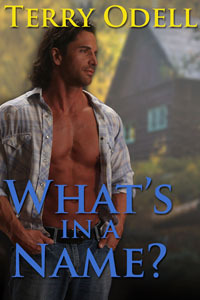
Running for the wrong reason can still get you killed.
Kelli Carpenter has changed her name, her appearance—her life—to avoid being connected to a crime she committed in self defense years ago. But just when she thinks she has nothing to fear, handsome stranger Blake Windsor shows up.
He claims to be the handyman her boss sent to help complete the project she's working on—Camp Getaway—a place where inner city kids will get respite from concrete and drive-bys. Being a loner has kept her alive, and Kelli's instincts tell her to leave. But without Blake's help, the refuge for inner city children won't be completed on time. Against her instincts, she accepts his help.
Blake Windsor, a corporate executive, accepted his boss's request to find out if Kelli Carpenter is really a woman his boss thinks he knew years before. He begrudgingly returns to the blue-collar construction lifestyle he vowed to leave behind, hoping doing this favor will advance his career. The woman he meets bears little resemblance to the woman he's supposed to find, but something about her mystifies him, and he decides to continue with his deception to learn more about her.
When someone makes an attempt on Kelli's life, she runs—but she takes Blake with her. Keep your friends close but your enemies closer is her philosophy. And Kelli is convinced Blake knows something that will link her to her former lover's death, ending her life as she knows it.
What's in a Name? is full of twists and turns as Blake and Kelli try to keep one step ahead of whoever is following them—while they try to figure out why.

Running for the wrong reason can still get you killed.
Kelli Carpenter has changed her name, her appearance—her life—to avoid being connected to a crime she committed in self defense years ago. But just when she thinks she has nothing to fear, handsome stranger Blake Windsor shows up.
He claims to be the handyman her boss sent to help complete the project she's working on—Camp Getaway—a place where inner city kids will get respite from concrete and drive-bys. Being a loner has kept her alive, and Kelli's instincts tell her to leave. But without Blake's help, the refuge for inner city children won't be completed on time. Against her instincts, she accepts his help.
Blake Windsor, a corporate executive, accepted his boss's request to find out if Kelli Carpenter is really a woman his boss thinks he knew years before. He begrudgingly returns to the blue-collar construction lifestyle he vowed to leave behind, hoping doing this favor will advance his career. The woman he meets bears little resemblance to the woman he's supposed to find, but something about her mystifies him, and he decides to continue with his deception to learn more about her.
When someone makes an attempt on Kelli's life, she runs—but she takes Blake with her. Keep your friends close but your enemies closer is her philosophy. And Kelli is convinced Blake knows something that will link her to her former lover's death, ending her life as she knows it.
What's in a Name? is full of twists and turns as Blake and Kelli try to keep one step ahead of whoever is following them—while they try to figure out why.
Published on July 31, 2011 05:55
July 30, 2011
And the Winners Are ...
Maryn Sinclair has announced the winners of her books. Congratulations to
Linda and Karen.
Email Maryn at MarynSinclair (at) gmail (dot) com and she'll get your prizes to you!
Thanks for commenting. And be sure to come back next week, because my guests have another giveaway.
Linda and Karen.
Email Maryn at MarynSinclair (at) gmail (dot) com and she'll get your prizes to you!
Thanks for commenting. And be sure to come back next week, because my guests have another giveaway.
Published on July 30, 2011 06:00



